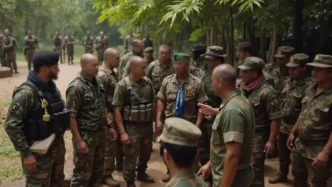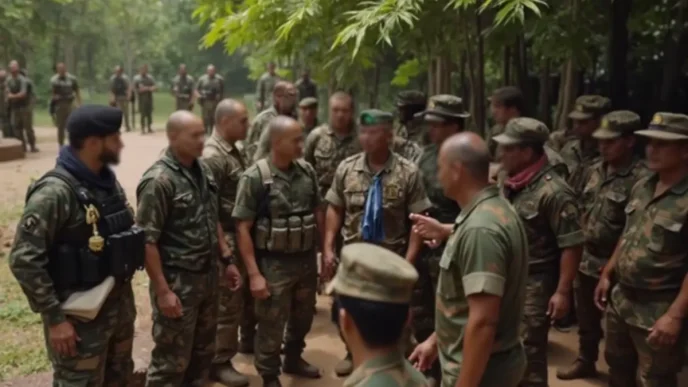Bangladesh has expressed tentative support for a United Nations proposal to establish a humanitarian corridor to Myanmar’s conflict-ridden Rakhine State, a move aimed at aiding the beleaguered Rohingya population. However, Foreign Adviser Touhid Hossain emphasized that specific conditions must be met before Dhaka can fully commit to the initiative. This development comes against a backdrop of heightened regional tensions, including a sharp escalation in the India-Pakistan conflict, which Bangladesh is keen to see resolved through dialogue.
Humanitarian Corridor: A Conditional Commitment
The idea of a humanitarian corridor gained momentum following a recent four-day visit to Bangladesh by UN Secretary-General Antonio Guterres. During his discussions with Bangladeshi authorities, Guterres highlighted the potential for channeling aid into Myanmar through Bangladesh as a step toward facilitating the repatriation of the Rohingya to Rakhine State. He acknowledged, however, that such an effort would hinge on the “authorisation and cooperation of the parties to the conflict” in Myanmar.
Speaking to reporters at the foreign ministry on April 28, 2025, Touhid Hossain confirmed Dhaka’s in-principle agreement but refrained from detailing the conditions attached to Bangladesh’s support. A diplomatic source, speaking on condition of anonymity, indicated that a primary concern for Dhaka is ensuring a safe and conducive environment for the return of the Rohingya, many of whom fled to Bangladesh amid violent military crackdowns in Myanmar starting in 2017. Currently, around 1.2 million Rohingya refugees reside in Bangladesh, primarily in overcrowded camps in Cox’s Bazar, placing immense strain on the country’s resources.
Touhid also addressed the complex dynamics along the Bangladesh-Myanmar border, noting that while Dhaka cannot officially engage with the Arakan Army—a group that reportedly controls over 80 percent of Rakhine State—it cannot remain entirely detached due to security concerns. The Arakan Army, an ethnic armed organization, has been a significant player in the ongoing conflict in Myanmar, complicating efforts to deliver aid or broker repatriation agreements. Analysts suggest that Bangladesh’s cautious stance reflects a balancing act between humanitarian imperatives and the geopolitical realities of dealing with non-state actors in a volatile region.
India-Pakistan Tensions: A Call for Dialogue
Beyond the Myanmar crisis, Touhid Hossain also weighed in on the deteriorating relations between nuclear-armed neighbors India and Pakistan, advocating for a negotiated settlement. “Our position is very clear. We want peace in South Asia. We are aware of the longstanding rivalry between Pakistan and India. We would expect the two countries to resolve the problem through dialogue” he told reporters. He further noted that Bangladesh maintains cordial ties with both nations, positioning itself as a neutral observer in the conflict.
The latest flare-up in tensions follows a deadly terrorist attack in Indian-controlled Kashmir last week, which claimed 26 lives and injured 17 others. India has accused Pakistan of supporting “cross-border terrorism,” a charge Islamabad has vehemently denied, dismissing the allegations as “frivolous.” The Resistance Front (TRF), believed to be linked to the Pakistan-based militant group Lashkar-e-Taiba, has claimed responsibility for the attack. While the incident has reignited historical animosities, Touhid made it clear that Bangladesh is not currently inclined to initiate mediation efforts unless explicitly requested by one of the parties. “In whatever ways, through mediation or bilateral discussion, we want the tension to diffuse and peace established” he reiterated.
Regional experts argue that Bangladesh’s call for dialogue, while unlikely to shift the entrenched positions of India and Pakistan, underscores Dhaka’s broader commitment to stability in South Asia. The country, which shares borders with India and has historical ties to Pakistan, has a vested interest in preventing further escalation that could spill over into its own security landscape. Some analysts speculate that unresolved tensions could also impact regional cooperation on issues like trade and counterterrorism, areas where Bangladesh has sought to play a constructive role.
Undocumented Migrants: A Question of Identity
Adding another layer of complexity to Bangladesh’s regional relations are recent reports of arrests of suspected undocumented Bangladeshis in India. International media outlets reported on April 25, 2025, that over a thousand individuals were detained in the Indian cities of Ahmedabad and Surat. Touhid Hossain stated that the Bangladeshi foreign ministry has yet to receive official communication from New Delhi regarding these arrests. “Even if there is official communication, whether they are Bangladeshis or not is subject to verification. There are also Bangla-speaking people in India. If they are from Bangladesh and that is proven, we will bring them back” he clarified.
The issue of undocumented migration has long been a sensitive topic between the two countries, with India frequently raising concerns about illegal border crossings. Bangladesh, for its part, has emphasized the need for thorough verification to avoid misidentification, given the linguistic and cultural overlaps in border regions. Touhid also advised Bangladeshi citizens to avoid non-essential travel to India, though no formal travel advisory has been issued. This cautious approach reflects Dhaka’s intent to manage bilateral relations diplomatically while addressing domestic concerns about the welfare of its citizens abroad.
Rohingya Repatriation: A Long Road Ahead
The proposed humanitarian corridor to Rakhine State is seen by many as a potential stepping stone toward addressing the protracted Rohingya crisis, one of the largest displacement issues in the world today. Since the mass exodus in 2017, multiple attempts at repatriation have stalled due to ongoing violence in Myanmar and a lack of guarantees for the safety and rights of returnees. The UN has repeatedly called for international support to alleviate the burden on Bangladesh, which has hosted the refugees despite significant economic and social challenges.
However, the feasibility of the corridor remains uncertain. Myanmar’s internal conflict, involving the military junta, the Arakan Army, and other ethnic groups, creates a fragmented landscape where securing safe passage for aid—let alone repatriation—is a daunting task. Bangladesh’s insistence on specific conditions likely includes assurances from both Myanmar’s authorities and influential non-state actors that returning Rohingya will not face further persecution. Without such guarantees, Dhaka appears reluctant to fully endorse the UN plan, wary of being drawn into a quagmire with no clear resolution.
International aid organizations have welcomed Bangladesh’s conditional support as a positive signal, though they caution that implementation could take months, if not years. In the meantime, the Rohingya in Bangladesh continue to live in limbo, with limited access to education, employment, and long-term security. For Dhaka, the corridor proposal represents both an opportunity to share the burden and a risk of entanglement in Myanmar’s intractable conflict.
Regional Stability: A Broader Perspective
Bangladesh’s foreign policy under its current leadership appears to prioritize stability and pragmatism, whether in addressing the Rohingya crisis or navigating South Asian rivalries. Touhid Hossain’s comments on both the humanitarian corridor and the India-Pakistan conflict reflect a consistent theme: a desire for dialogue and cooperation over unilateral action. This approach aligns with Dhaka’s historical role as a mediator in regional affairs, though its capacity to influence outcomes in either Myanmar or between India and Pakistan remains limited.
Looking ahead, Bangladesh faces the dual challenge of managing its internal pressures—stemming from hosting a vast refugee population—and maintaining constructive relations with its neighbors. The proposed humanitarian corridor, if realized, could mark a significant step toward alleviating the Rohingya crisis, but only if the underlying conditions of safety and cooperation are met. Similarly, while Dhaka’s call for peace between India and Pakistan may not yield immediate results, it reinforces the country’s commitment to a stable South Asia.
As these complex issues unfold, questions linger about the broader implications for regional security and humanitarian efforts. Will the international community step up to support Bangladesh in its conditional endorsement of the UN corridor? And can dialogue prevail in a region long marked by conflict and mistrust? For now, Dhaka stands at a critical juncture, balancing its humanitarian obligations with the pragmatic realities of geopolitics.














